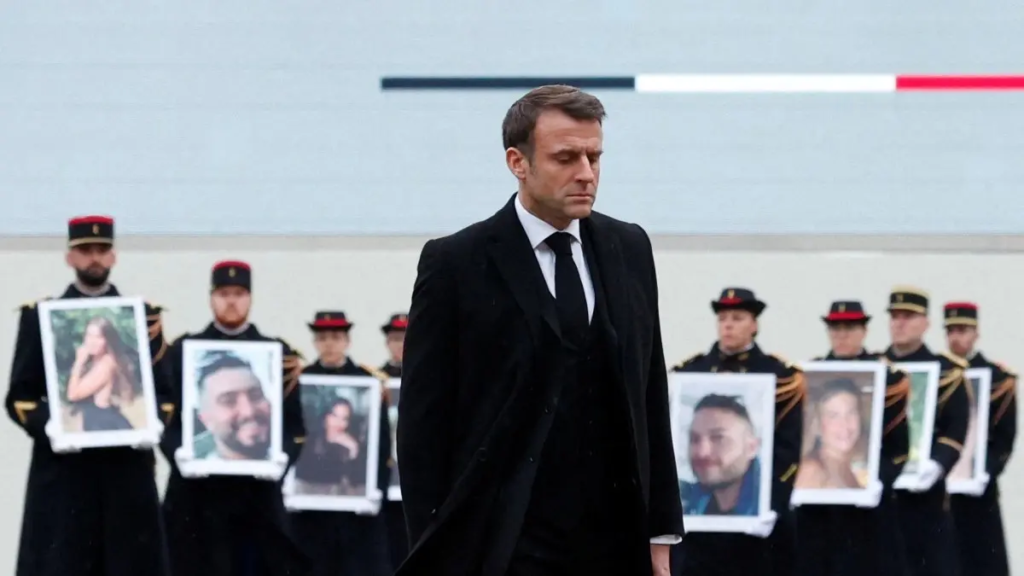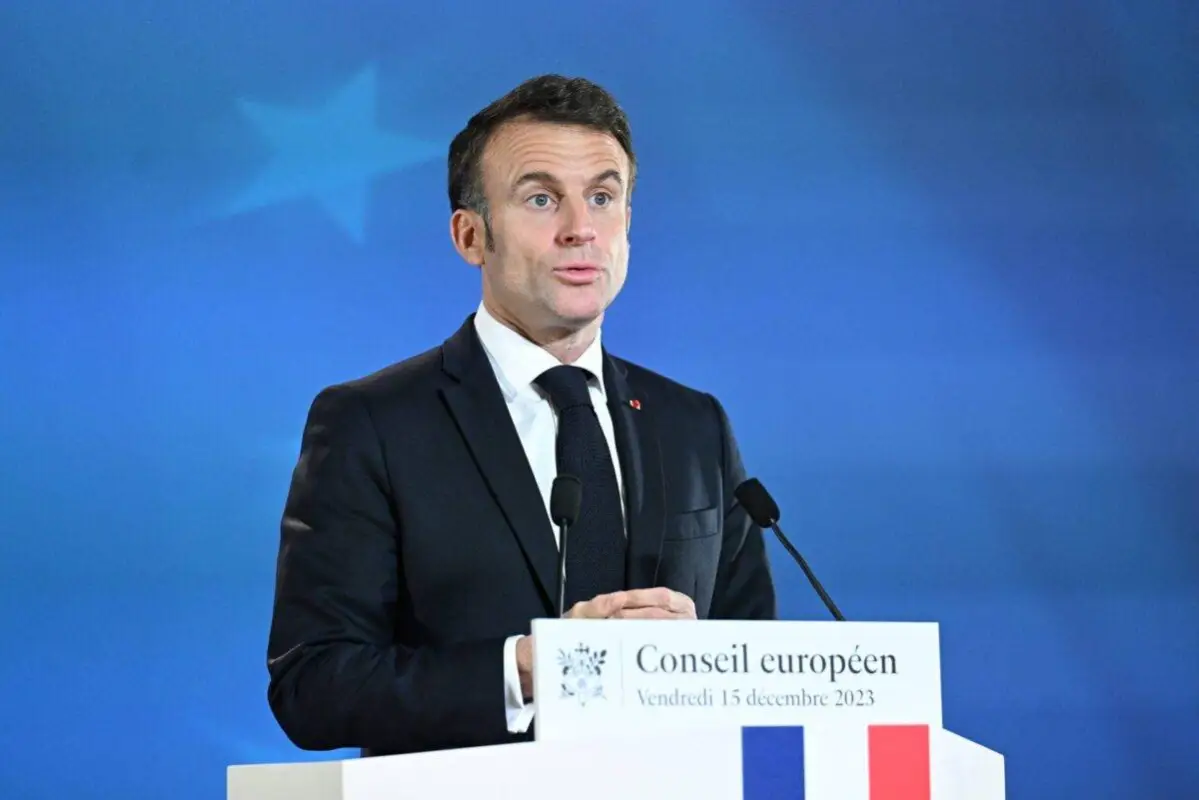The diplomatic tensions between Israel and France have escalated following the recent decision by the French government to ban Israeli firms from participating in the Euronaval military naval trade show.
This move, rooted in France’s concerns over Israel’s military conduct, has sparked strong reactions from Israeli officials, including Foreign Minister Israel Katz, who has announced plans to take legal action against French President Emmanuel Macron.
The ban, which affects several Israeli defense companies, has created a rift between the two nations, raising questions about the future of their diplomatic and trade relations.
The Ban and Its Implications
The Euronaval trade show, set to take place in Paris from November 4-7, is one of the world’s leading events for the naval defense industry, drawing participants from around the globe to showcase cutting-edge maritime technology and defense equipment.
Israeli companies, which are known for their advanced military and defense products, have been regular participants in such international exhibitions, using the platform to promote their innovations and establish global partnerships.
However, in a recent development, the French government informed Euronaval organizers that Israeli delegations would not be allowed to exhibit their products at the upcoming show.
While Israeli representatives are permitted to attend the event, they have been barred from setting up stands or displaying equipment. This decision affects seven Israeli companies, all of which specialize in defense technologies relevant to naval security and warfare.
Read : Canadian PM Solely Responsible for Damage to India-Canada Relations: India
The ban has been described by Israeli officials as a discriminatory measure, especially considering that it is not the first time Israeli firms have faced restrictions in France. The Macron government’s unease over Israel’s military conduct in the Gaza Strip and Lebanon appears to be a driving factor behind this decision.
France, like several other European nations, has expressed concern over Israel’s actions during conflicts with Palestinian militant groups and Hezbollah, leading to friction in diplomatic relations.
Israel’s Response and Legal Action
Israel’s response to the ban was swift and resolute. Israeli Foreign Minister Israel Katz took to social media to condemn the decision and announced that he had ordered his ministry to begin legal proceedings against French President Emmanuel Macron.
Katz described the ban as an undemocratic act and emphasized that such measures should not be imposed between friendly nations. He called on Macron to reverse the decision and allow Israeli companies to participate fully in the Euronaval exhibition.
In his statement, Katz highlighted that this was not the first time Israeli firms had been subjected to what he termed as a boycott in France. He argued that barring Israeli companies from showcasing their products at international trade events damages not only the companies themselves but also the broader relationship between Israel and France. Katz’s move to pursue legal action signals Israel’s determination to challenge what it perceives as unfair treatment in international forums.

Legal experts believe that the case could revolve around issues related to trade discrimination and the violation of agreements that allow for the free exchange of goods and services between nations. Israel may argue that the ban infringes upon the rights of its companies to participate in international markets on an equal footing. Additionally, the diplomatic aspect of the case cannot be overlooked, as Israel will likely use both legal and diplomatic channels to press for a reversal of the ban.
This legal challenge may also have broader implications for other countries that are involved in defense trade with Israel. The outcome of the case could set a precedent for how similar disputes are handled in the future, particularly in relation to the military and defense industries, which are often influenced by geopolitical considerations.
The Broader Impact on Israel-France Relations
The ban on Israeli companies at the Euronaval trade show is just one episode in a larger context of strained relations between Israel and France. While the two countries maintain diplomatic ties, their relationship has been tested by differing views on Middle East conflicts, particularly Israel’s military actions in Gaza and Lebanon. France, under President Macron, has been vocal in its criticism of Israel’s handling of conflicts with Palestinian militant groups, calling for restraint and the protection of civilian lives.
In recent years, France has also expressed its opposition to Israeli settlement expansion in the West Bank and has supported initiatives aimed at achieving a two-state solution to the Israeli-Palestinian conflict. These positions have led to diplomatic tensions between the two nations, with Israel often pushing back against what it sees as interference in its internal security matters.

The trade show ban can be seen as an extension of these tensions, with France using its influence in the international arena to signal its disapproval of Israeli policies. For Israel, the ban is not only a commercial setback but also a political one, as it hampers its ability to showcase its defense technology on the global stage.
Israeli defense companies are among the world’s leaders in developing advanced military technology, and participation in international trade shows is crucial for maintaining their competitive edge.
The rift between Israel and France over the trade show ban may also have repercussions for their economic and military cooperation. While France is a key player in European defense, Israel has traditionally had strong ties with countries like Germany and the United Kingdom in terms of defense collaboration.
The ban could push Israel to seek stronger ties with other European nations or look to expand its defense partnerships outside of Europe, particularly with countries in Asia and Africa.
Moreover, the ban raises questions about the future of defense trade shows as platforms for international cooperation. In an increasingly polarized world, where geopolitical tensions influence trade decisions, events like Euronaval could become battlegrounds for political disputes, with countries using their hosting privileges to exclude participants based on political or military disagreements.

The legal and diplomatic fallout from the ban on Israeli companies at the Euronaval trade show is likely to have long-lasting implications for Israel-France relations. While the Macron government’s decision to exclude Israeli firms is rooted in concerns over Israel’s military conduct, the move has been met with fierce opposition from Israeli officials who view it as an unfair and undemocratic act.
The legal proceedings initiated by Israel’s Foreign Ministry are a clear indication that Israel is prepared to challenge the ban on multiple fronts.
As the case unfolds, it will test the resilience of the diplomatic ties between the two nations. Israel and France have a history of cooperation, but their relationship has been strained in recent years due to differing views on Middle East conflicts. The outcome of this legal challenge could either lead to a resolution that strengthens bilateral ties or further deepens the divide.
Ultimately, the ban on Israeli companies at the Euronaval trade show highlights the intersection of trade, diplomacy, and geopolitics. In a world where military and defense industries play a significant role in international relations, decisions like this one are rarely confined to the realm of commerce. They are political statements that have the potential to reshape alliances and influence the direction of global diplomacy.
let’s enjoy few years on earth with peace and happiness….✍🏼🙏

